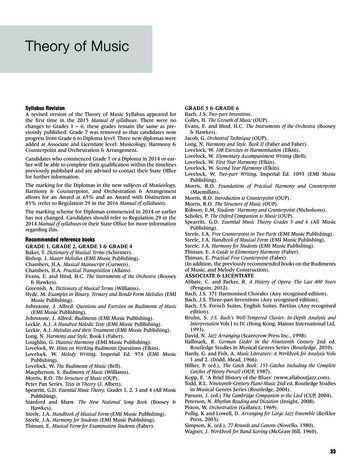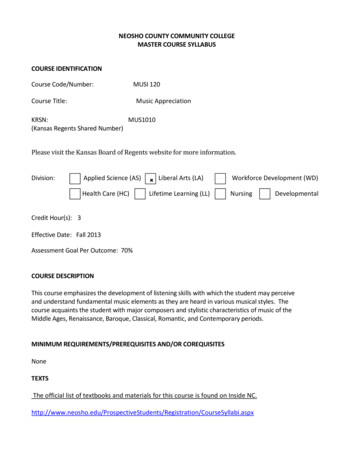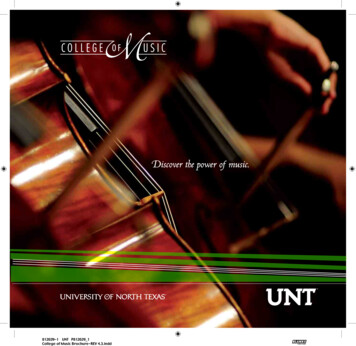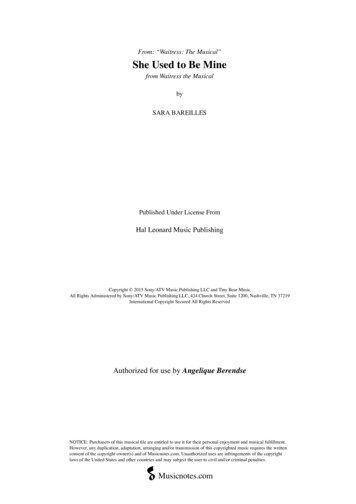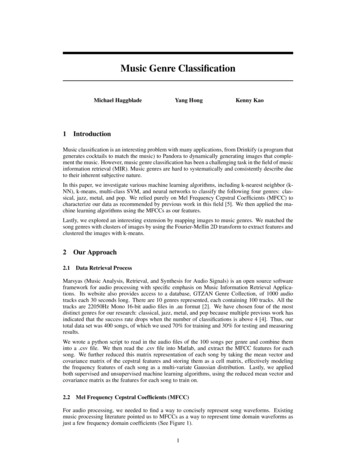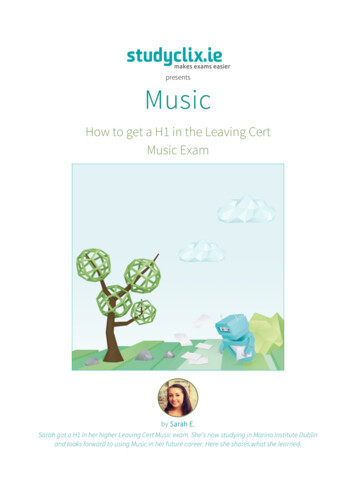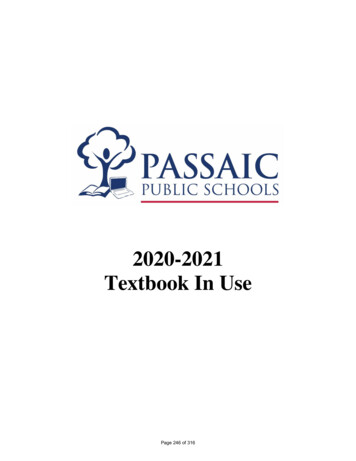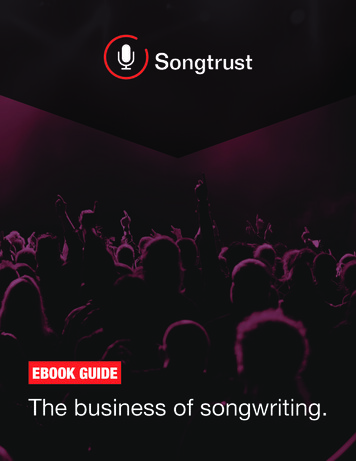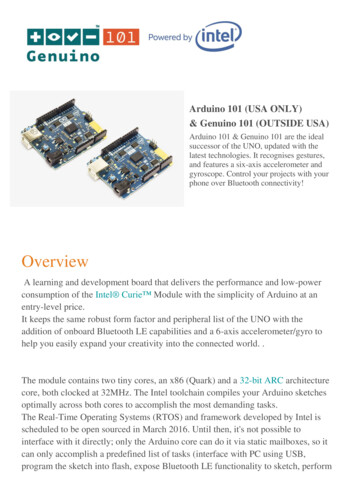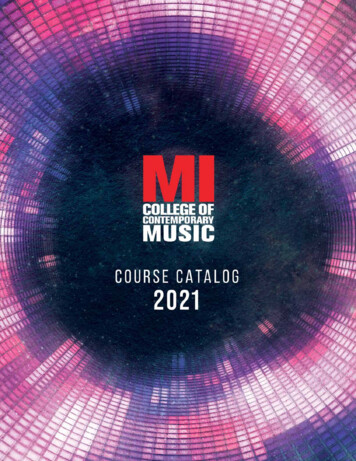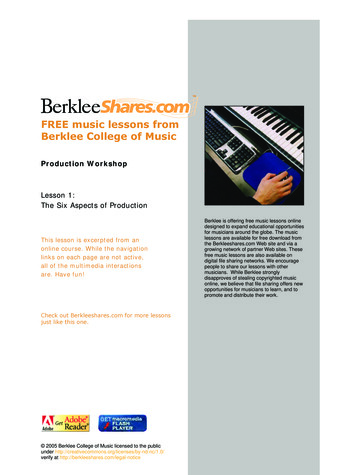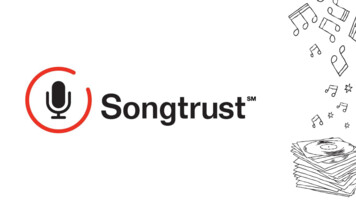
Transcription
#MusicPublishing101 @songtrustMusic Publishing 101Songtrust Webinar July 2018
#MusicPublishing101 @songtrustJulia PerniconeKyle ThiedeCJ OlivieriPublishing Operations ManagerAssociate Director, Publishing OperationsClient Acquisition ManagerJulia is the Manager of PublishingOperations at Songtrust, where sheoversees the processes of theOperations team, with a focus onYouTube monetization and clientservice.Kyle is responsible for the management,strategy and execution of newoperational procedures plus objectivesto promote company growth andefficiency. He also develops andmaintains Songtrust's global network ofsociety partnerships.CJ manages the Client AcquisitionTeam, focused on identifying andseamlessly transitioning songwritersin need of global publishing onto theSongtrust platform.
#MusicPublishing101 @songtrustToday’s AgendaWe hope you’ll take away: A better understanding of what music publishing is The essential parts of publishing everyone should know What role publishing plays in your revenue collection What happens if you don’t have publishing How Songtrust comes into play and how our platform can help you betterutilize your publishing knowledge to be more successful
#MusicPublishing101 @songtrustMUSIC PUBLISHINGMusic Publishing is the business of protecting and promoting song copyrights andcollecting the royalties that these copyrights generate. Think of a song as intellectualproperty (it's an original piece of art), and music publishing as the business that makes surethat songwriters get paid a fair compensation when their intellectual property is used bycompanies. Those companies could be record labels (mechanical royalties), radio stations,bars, and restaurants (performance royalties), or film studios and advertising agencies (synclicense fees), and many more.
#MusicPublishing101 @songtrustBeing A Rights OwnerWhat happens when you write a song?What rights do you get?What royalties are generated?As soon as you fix it in a tangible form (like ademo), you own the copyright and you are thepublisherMultiple writers determine their split of thecopyrightReproduce the workDistribute copies of the workPerform the work publiclyMake a derivative workDisplay the work publiclyMechanicalPerformanceSync
#MusicPublishing101 @songtrustWhat It Means To Be A Rights OwnerWhen you write a song, you are the rights owner, or own the copyright, immediately don’t forget that! Copyright - a legal right created by the law of a country that grants the creator of anoriginal work exclusive rights for its use and distribution. What rights you get when you own the copyright? Reproduce the work Distribute copies of the work Perform the work publicly Make a derivative work Display the work publicly
#MusicPublishing101 @songtrustComposition vs alPRO’s(US/Canada)ASCAP, BMI,SOCAN, etcCMO’s(International)GEMA,SACEM,SACM, altiesNeighboring RightsCompositionMasterRecordingOriginal WorkSyncMechanicalRoyaltiesFilm/TVPublishing (YouTube)Recording Artist
#MusicPublishing101 @songtrustComposition vs RecordingUnderstanding how your song is broken down will help you navigate various areas of themusic industry, including publishing. Composition - refers to the underlying musical composition of a piece of music; the musicand lyrics. Recording - physical record of a musical performance that can then be played back, orreproduced. What’s the difference? Recordings are typically owned by the party that paid for the studio time. For anindependent artist, the artist themselves owns the recording; when a label is involved, thelabel will share ownership with the recording artist and producer(s). A composition is owned by the songwriters of that composition. Those songwriters maychoose to share ownership with a publisher. If not, they themselves are the publishers.
#MusicPublishing101 @songtrustWriter’s vs Publisher’s ShareUnderstanding how the breakdown of your ownership, especially when dealing with multiplewriters, is vital at the beginning. Writer’s Share - The percentage of ownership in a work attributable to the author and/orcomposer. Publisher’s Share - The share of revenues that may be granted to a music publisher via apublishing contract - depending on the type of publishing agreement (i.e. songwriter,co-publishing, sub-publishing, administration). If you do not have a publisher, you own this share as well.
#MusicPublishing101 @songtrustSplit SheetsThe agreement between you and theco-writers about who will receive whatshare of future royalties.Typical Example:100% Publishers Share 100% Writers ShareMulti-Writer Example:50% Writer #1 share 50% Writer #2 share
#MusicPublishing101 @songtrustPublishing DealsThere are different types of publishing deals and each one has their pros and cons: Co-Publishing Deal - A type of publishing agreement whereby two or more publishers willshare in the ownership of a copyright for a specific work or body of works. Typically, onepublisher will have full administration rights. This type of publishing agreement often appliesin cases where the composer is a recording artist or producer. Publishing Administration Deal - A third-party publisher that, for a fixed term, controls alllicensing and the collection of publishing revenue streams on behalf of a composer orcopyright owner for a fee, but does not own any portion of the copyrights. Sub-Publishing - A company that is assigned the right to administer songs in a certainterritory. For example, an American publisher would engage the services of a sub-publisherin Germany to handle its affairs in that country.
#MusicPublishing101 @songtrustPublishing Deals ExplainedCo-PublishingPublishing AdministrationDeal Length: Typically 3 years, fixed termDeal Length: Typically one year, flexible termPay-out: Pays only 2x per yearPay-out: Varies, 2-4x per yearCatalog: Generally includes all songs writtenCatalog: You only register the songs youduring the termwant to, no requirementsCopyright: Give publisher 25-50% of yourCopyright: Keep 100% of your copyrightcopyright for lifeSync Rights: You control your sync rightsSync Rights: Give up sync rights so publisher canFees: Typically a registration fee, and aexclusively license15-25% administration feeFees: Varies for royalty streams and upwards of50% of sync licenses
#MusicPublishing101 @songtrustPUBLISHING ESSENTIALS
Collective Management Organizationsand many more . . .
CMOs & PROs ExplainedCollective Management Organizations, or CMOs, typically represent groups of copyright and related rights owners inthe the licensing of copyright and related rights by organisations acting on behalf of rights owners. CMO is used whentalking about international organizations, usually, as some will include the collection of mechanical rights.Performing rights organizations, or PROs, are societies responsible for collecting income on behalf of songwritersand music publishers when a song is publicly broadcast. PRO is used when talking about a collection society thattypically only collects performance royalties, often in the US or Canada. When do they collect royalties? When a song is publicly broadcast which can include play in television, radio, clubs, restaurants, websites, or otherbroadcasting systems. This may differ for CMO’s that also collect mechanical royalties - make sure to know whatyour CMO/PRO specifically collects None are the same! Each collection society differ in registration processes, fees, requirements and more. They often work by territory,but still make sure to know what and where your society will collect on your behalf. Do you need a PRO/CMO? Yes! In order to collect your performance royalties, you must be registered with your territory’s PRO or CMO.Why do I need publishing when I have a PRO/CMO? Depending on the PRO/CMO, they may not collect all of your royalties. Some only collect performance royaltiesand not mechanical, and most do not efficiently collect outside of their home territory.
#MusicPublishing101 @songtrustWhat Are Royalties?Performance RoyaltiesWhen your song is publicly performedMechanical RoyaltiesWhen your song is streamed or physicallyreproduced Interactive Radio (ex. Pandora) Restaurant or bar CD, vinyl, or digital download Streaming services (ex. Spotify, Streamed “on demand” services (ex.Apple Music, etc)Spotify)
#MusicPublishing101 @songtrustWhere Do Royalties Come From?Performance RoyaltiesMechanical RoyaltiesWhen your song is publicly performedWhen your song is streamed or physically reproducedPROsMechanical Rights SocietiesASCAP, BMI, SOCAN, etcHFA, CMRRA, etcOften paid directly to the songwriterTypically paid to a publisher
#MusicPublishing101 @songtrustRetroactive RoyaltiesEven if you aren’t physically collecting royalties, your song is generating them if it is beingperformed, sold, or streamed. You’re still entitled to these royalties, even if you aren’t able tocollect them until later. Different societies and royalty types have different timelines within which youcan collect retroactive royalties These can become Black Box royalties if unclaimed after a certain period oftime
#MusicPublishing101 @songtrustBlack Box RoyaltiesAlso known as black box income, these unmatched royalties are impossible to retrieve. Black Box Royalties - these are unclaimed royalties for which a publisher or writer is namedbut cannot be traced by a collection society. After a certain period of time, the society will release these royalties to their members,paying out based on market share.
Streaming Royaltiesand many more . . .
Streaming RoyaltiesStreaming Royalties are mechanical royalties paid out when a user streams your songdigitally. Each platform pays out differently and has their own submission process.Streaming has become a huge part of sharing music globally. While these payouts change frequently and may not include the entire amount (ie. they amount getspaid to several people), knowing what the payouts are by streaming platform is important, especiallywhen making the decision on where you’ll place your songs. Examples: Tidal - 0.0110 Apple Music - 0.0064 Google Play - 0.0059 Spotify - 0.0038 Pandora - 0.0011You should know how to best utilize these platforms and market your songs, and who collects theseroyalties, to achieve higher streams. You can see some tips on getting more streams, here.
YouTubeAnother popular platform for musicians, understanding how YouTube works and how videosare monetized is very important. YouTube’s Content ID allows rights holders to claim and monetize UGC (user-generated content) that usesmusic. Videos without an advertisement being served are NOT being monetized, and there are no retroactiveroyalties to be collected for previous views. YouTube recently enacted thresholds for monetization on videos The channel must have at least 1,000 subscribers and 4,000 hours of watch time in the last 12months Videos on channels not eligible for monetization with 10,000 views are manually reviewed byYouTube before monetization is enabled The rate at which video views are paid out depends on many factors: the type of ads being served, theterritory in which the view occurred, the time of year the view occurred, how much of the video/ad waswatched, etc.
#MusicPublishing101 @songtrustTouring SetlistsIf you fancy yourself a performing artist, getting facetime in front ofyour fans and the public is vital. Submitting those setlists, thewritten account of which songs you played, is key to earningperformance royalties. Setlist submission rules vary by territory/society It is best practice to keep a record of your setlists andsubmit after every performance
#MusicPublishing101 @songtrustSharing Your Music
#MusicPublishing101 @songtrustWHAT AFFECTS PUBLISHING
#MusicPublishing101 @songtrustCovers & SamplingDespite its deep roots in musical tradition, covering and sampling other artists’ work is asticky topic. We encourage you to be inspired by other artists and create songs from thatinspiration, just do it legally. Covers and samples both describe the use of pre-existing material; one is essentially areproduction of a work, the other uses the intellectual property within a new work. Know the legal ramifications of both, as each situation differs For Covers: you need to obtain a mechanical license from the publishers/songwriters torecord a cover (this is set at a statutory rate), and a sync license if you record a video (this isnegotiated) For Samples: you need two different licenses - one for the master recording and the other,for usage of the composition from the publisher/songwriter. These rates are negotiated, andyou will often need to credit the songwriters of the sampled work as writers on the newwork.
#MusicPublishing101 @songtrustDistributionDistribution is the avenue in which you share your songs with the world. Distribution - Making recordings available on digital services to be streamed/sold as well asphysical reproduction ISRC - (International Standard Recording Code) This 12-character alphanumeric code is used touniquely identify a sound recording. Publishers, collection societies and music services use ISRCs tomatch master recordings to underlying compositions. ISRCs are typically assigned by your label ordistributor. Why do you need a distributor? In order to receive an ISRC code so that your song can betracked, and ultimately royalties collected on, you have to have a distributor. There are some DIYways to distribute your music, but a company will be able to make sure your songs are everywherethey should be. Do you collect royalties if you don’t have a distributor? Honestly, not really. Without those codesor a way to track your songs, and without your songs getting out in front of people, there aren’t asmany ways to collect royalties on your songs.
#MusicPublishing101 @songtrustBeing Your Own PublisherChoosing a publishing deal depends on your situation and your means. Sometimes, actingas your own publisher can be a better option than taking a deal. What does it mean to be your own publisher? As a songwriter and owner of a copyright, you are also apublisher. If you register your own works and do not sign away any portion of your ownership to anotherpublisher, you act as your own publisher. However, in order to collect all royalties owed to you, you must beable to affiliate with PROs and mechanical collection societies worldwide, which is difficult, expensive, timeconsuming, and in many cases, impossible. What is a “publishing entity”? Some PROs will not pay you your publisher’s share unless you have affiliatedwith them as a publisher in addition to affiliating as a writer. In order to collect your publisher’s share, you canaffiliate a publishing entity/company directly with your PRO. However, you don’t need a publishing entity in allsituations to collect your publisher’s share, nor do you need one if you have an administrator collecting onyour behalf. Sub-Publishing: A foreign publisher that represents the entire catalogue or individual copyrights of anotherpublisher (the "original publisher") in another country. Sub-publishers generally do not have any ownershipshare and for the most part focus on administration, although creative exploitation may also be undertakenby foreign sub-publishers.
Costs Of Being Your Own Publisher
#MusicPublishing101 @songtrustSONGTRUST & PUBLISHING
150,000 Songwriters registered with Songtrust20,000 Music publishers collecting their royalties globally1MM Copyrights represented
1 in 5 new professional songwriters in the US touch the Songtrust platform today.We currently administer music publishing for clients in every state in the United Statesand 87 countries around the world.
8Offices in major musicmarkets around the globe40 100 Direct Society DSPRelationshipsCountries Covered forRoyalty Collection
Where Does Songtrust O’s(US/Canada)ASCAP, BMI,SOCAN, etcCMO’s(International)GEMA,SACEM,SACM, altiesNeighboring RightsCompositionMasterRecordingOriginal WorkSyncMechanicalRoyaltiesFilm/TVPublishing (YouTube)Recording Artist
#MusicPublishing101 @songtrustSongtrust vs Traditional Publishing
#MusicPublishing101 @songtrustFor a demo of the Songtrust Platform,email:CJ Oliviericolivieri@songtrust.com
#MusicPublishing101 @songtrustTHANK YOU!
Publisher's Share - The share of revenues that may be granted to a music publisher via a publishing contract - depending on the type of publishing agreement (i.e. songwriter, co-publishing, sub-publishing, administration). If you do not have a publisher, you own this share as well. #MusicPublishing101 @songtrust
